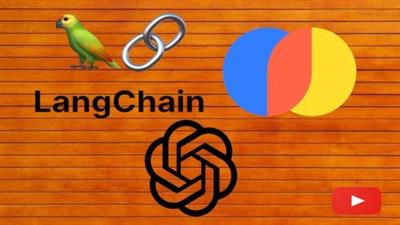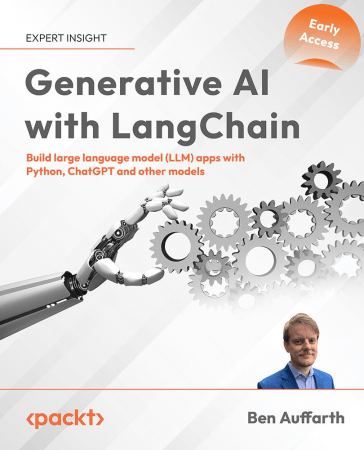
LangChain & OpenAI ChatGPT API for No–Code Python Developers
Posted on 30 Oct 09:30 | by Apple | 0 views

Free Download LangChain & OpenAI ChatGPT API for No–Code Python Developers
Published 10/2023
Created by Yahya Khawam
MP4 | Video: h264, 1280x720 | Audio: AAC, 44.1 KHz, 2 Ch
Genre: eLearning | Language: English | Duration: 8 Lectures ( 44m ) | Size: 336 MB
Future of Coding: Let AI do your Python Projects with Zero Code
What you'll learn
Increase your productivity as programmer by letting AI do your programming work.
Learn LangChain to build AI apps.
Learn how to analyze your data in a safe way without uploading to any server or cloud provider
How to build a tool called PyGenX, which is designed to increase programmers' productivity through zero-code development.
Learn the capability of PyGenX to generate and execute Python code based on user prompts or commands.
The significance of data privacy considerations when using AI models like ChatGPT for various data-related tasks such as machine learning and data analysis
Learn data-agnostic techniques that perform tasks without letting LLMs access, storing, process, or utilize user-specific data.
Build Python software and data-centric applications just using prompts and commands.
Requirements
being comfortable with Python
Description
The goal of this course is to teach you how to build a tool that helps increasing programmers productivity by utilizing LLMs for zero-code development. This tool is called PyGenX which stands for Python Generator and Executor. This tool basically generates Python code and executes it based on a user's prompt or command. Now, there has been increasing concerns about data privacy and security when using AI models like ChatGPT for various purposes including data analysis, machine learning and and other data related tasks. Concerns often revolve around data storage and retention, data usage, data sharing with third-party, and other ethical considerations. With such concerns in mind, PyGenX can take care of data privacy when zero-code developing in Python. This is done through data-agnostic techniques which are designed to perform the same programmers' tasks without accessing, storing, processing, or utilizing user-specific data. In this way, LLMs vendors are not exposed to your data even if those LLMs run in the cloud such as GPT-4 or GPT-3.5-turbo. Running PyGenX locally—i.e., on your own hardware—offers several advantages, especially if you're concerned about privacy, latency, and data control. Here are the main benefits as a result of using PyGenX:Data Privacy: Running the application locally ensures that your data never leaves your machine, offering a high level of data security and privacy.Low Latency: Local execution can eliminate the round-trip time to the cloud server, resulting in faster response times. This is important for real-time applications.Customizations: Running locally can offer greater flexibility in terms of customization and integration with other local systems and data sources.Resource Utilization: When you run the LLM-generated code on your local machine, you have more control over hardware resource utilization of CPU, GPU and memory.PyGenX greatly increases programmers productivity for various application such as: data analysis and visualization, machine learning and deep learning development, code documentation and refactoring, automation and scripting, file operations, web development, and other software development applications. Basically, the strength and effectiveness of zero-code programming in Python using PyGenX depends on the power of the LLM used with it.Who Is This Course For?Data Analysts: This course can empower data analysts to automate routine data cleaning, transformation, and visualization tasks without getting entangled in the intricacies of Python code, thus streamlining their workflow.Researchers: Academic or industry researchers from diverse fields can benefit from this course by quickly prototyping data models and running analyses without the need to master complex programming, thereby accelerating their research outcomes.Software Developers: Experienced software developers may find value in leveraging automated zero-code techniques to rapidly prototype or build out features, freeing them to focus on more intricate and critical parts of their applications.Python Programmers: Even for those proficient in Python, this course offers insights into automating repetitive tasks and implementing quick solutions without manual coding, enhancing productivity and code quality.AI Engineers: AI professionals can utilize this course to expedite the data preprocessing, model tuning, and deployment aspects of machine learning projects, thereby focusing more on algorithmic challenges and innovations.Anyone who wants to harness the power of zero-code programming in Python: This course serves as an essential guide for anyone interested in harnessing the power of automated zero-code solutions to make Python programming more accessible and efficient, regardless of their background or field.Students from various fields: Whether studying engineering, business, science, or the arts, students can take this course to automate data-related tasks for academic projects or research without the need to dive deep into programming, offering a practical skill set for their future careers.
Who this course is for
Data Analysts
Researchers
Software Developers
Python Programmers
AI Engineers
Anyone who wants to harness the power of zero-code programming in Python
Students from various fields
No Password - Links are Interchangeable
Related News
System Comment
Information
 Users of Visitor are not allowed to comment this publication.
Users of Visitor are not allowed to comment this publication.
Facebook Comment
Member Area
Top News



